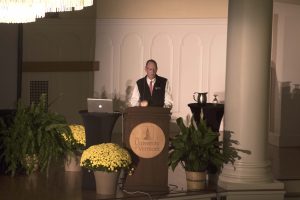Health expert calls on students
November 8, 2016
Hundreds added to the congestion and clamor of Ira Allen Chapel as they squeezed into the pews.
When Paul Farmer, the 2016 George D. Aiken Lecture Keynote, took the stage Thursday night Nov. 3, the crowd erupted into applause.
“Could we do that again?” he asked , grinning ear-to-ear, in response to the crowd. They chuckled and began a second round of applause.

But this lighthearted mood did not last more than 10 minutes.
The large room fell silent as devastating images of annihilated infrastructure and desperate human beings appeared on large screens.
In 2010, a 7 magnitude earthquake rocked Haiti, destroying multiple hospitals and leaving countless Haitians displaced and severely injured, Farmer said.
Based on that context, he discussed the Partners In Health push for a new, post-earthquake teaching hospital located in central Haiti to provide top notch health care and medical education to Haitian citizens.
Partners in Health is a nonprofit organization dedicated to providing healthcare to the sickest and poorest people everywhere in the world. Farmer co-founded PIH after his first visit to Haiti, which was in between his undergraduate studies and medical school. While there, he said he saw so many people die due to the lack of resources, and that was his inspiration to start the organization.
Farmer then said that although many of his peers mocked his goal to build a new teaching hospital, there was an explicit demand for it based on earthquake trauma and the increasing prevalence of the Ebola virus. “Is it necessary to have a teaching hospital in central Haiti? Yes, yes, it is” he said with intensity.
The teaching hospital is now operating and providing health care to roughly 185,000 Haitians, according to the Partners In Health website. Farmer made sure to formally thank UVM for supporting the project; he said, “Thank you for being one of the ones who was with us in critical times.”
Later in the presentation, Farmer clarified his phrase “cultural humility,” a term he frequently mentioned in his lecture. He explained that cultural humility is being aware that you are not culturally competent, and therefore proceeding with great humility. He identified this as a necessity in global health care.
On the same subject, Farmer added that the aspiration of global health should be to provide the same standard of care as we want for each other, and we should do so with respect for other’s traditions.
Based on the long standing ovation following his lecture, Farmer’s visit was quite the hit.
Ian McHale, a senior public health student, shared his impression. He said “Having Dr. Farmer here allows us to dive into the conversations that we need to have to make sure the work we are doing as a university is done properly and is addressing the root issues of disease, poverty etc.”
Bill Falls, dean of College of Arts and Sciences, also commented. Falls said “Farmer is the advocate and change agent for health care justice. We have faculty throughout the University whose scholarship is in the area of health, global health and social justice. His presence calls attention to their work and stimulates students to think deeply about studying and working in these areas.”
Later, during Q&A, Farmer was asked how students could get involved with the global health movement. He said, “Don’t forget Partners In Health was started by students … Students bring in a lot of new ideas.”
Farmer’s presentation concluded with an emphasis on global health innovation. He said, “Failure of imagination is the chief obstacle before us.”






